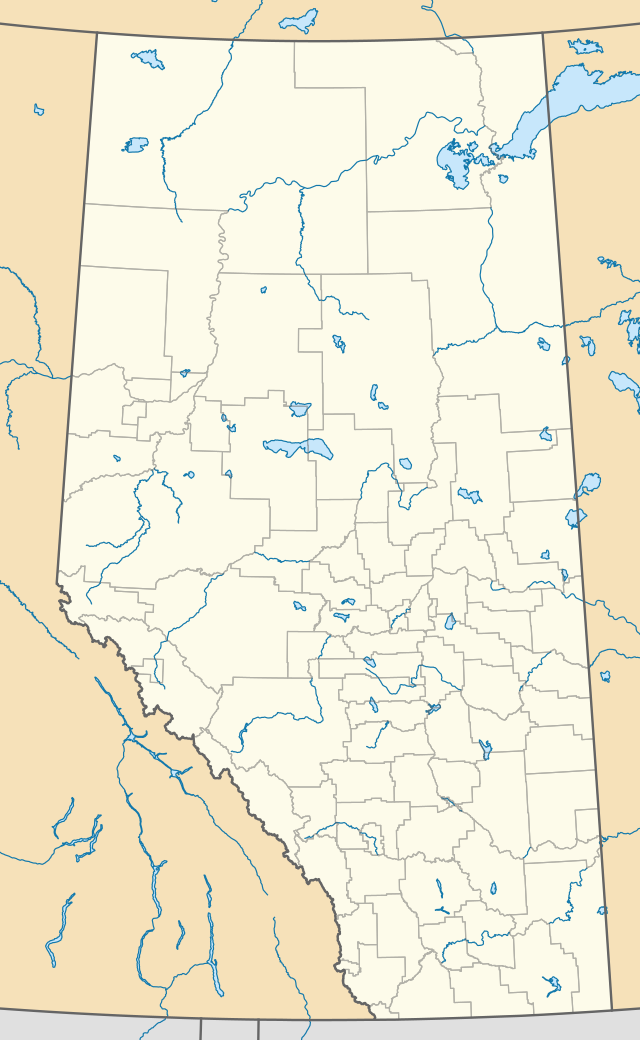Kimball, Alberta
Kimball is a hamlet in southern Alberta, Canada within Cardston County.[1] It is located on Highway 501, approximately 16 kilometres (9.9 mi) southeast of Cardston between the St. Mary River and the Milk River Ridge. The community is named after the Mormon ward which was named after the descendants of Heber C Kimball.[2]
Kimball | |
|---|---|
Hamlet | |
 Kimball | |
| Coordinates: 49°04′31″N 113°12′13″W | |
| Country | |
| Province | |
| Region | Southern Alberta |
| Census division | 3 |
| Municipal district | Cardston County |
| Founded | 1900 |
| Government | |
| • Governing body | Cardston County Council |
| • MP | Jim Hillyer |
| • MLA | Gary Bikman |
| Time zone | UTC-7 (MST) |
| Postal code span | |
| Area code(s) | +1-403 |
| Highways | Highway 501 |
Regional attractions
- Woolford Provincial Park
- The Woolford Provincial Park is a provincial park located 17.5 km (11 mi) east of Cardston, west of Highway 503 just west of Woolford.
- Cardston Alberta Temple
- The Cardston Alberta Temple is one of southern Alberta’s most recognized landmarks. It was constructed by Mormon pioneers who settled Cardston in 1887. The temple became the centerpiece of the town, and it was the second temple constructed by the Church outside of the continental U.S.
- Remington Carriage Museum
- The Remington Carriage Museum houses the largest collection of horse-drawn vehicles in North America, with more than 250 carriages, wagons and sleighs. The 63,000-square-foot (5,900 m2) feature video displays a fire hall, carriage factory, restoration shop, working stable, carriage rides, carriage rentals, a restaurant and a shop. Guided tours are offered for free. On April 9, 2006, the museum was briefly mentioned on TV in Canada as a destination of Patty and Selma's vacation during the Kiss Kiss, Bang Bangalore episode of The Simpsons.
- Waterton Lakes National Park
Waterton Lakes National Park is a national park in the southwest corner of Alberta, 40 km (25 mi) west of Cardston, and borders Glacier National Park in Montana, USA. Waterton Lakes was Canada's fourth national park, formed in 1895. Amid the peaks are the lakes of Waterton Lakes National Park, carved out of the rock by glaciers.
- Frank Slide Interpretive Centre
On April 29, 1903, at 4:10 a.m., the mining town of Frank, Alberta, was devastated by 82 million tonnes of limestone crashing down from Turtle Mountain. The Frank Slide Interpretive Centre in the Crowsnest Pass, 130 km (81 mi) northwest of Cardston, tells of one of the greatest natural disasters in Canadian history.
- Castle Mountain Ski Resort
Castle Mountain Resort 90 km (56 mi) west of Cardston has kilometres of groomed skiing runs, natural half pipes, deep fresh powder, short lift lines and wide open spaces.
- Police Outpost Provincial Park
Police Outpost Provincial Park is 32 kilometres (20 mi) south of Cardston, on the Canada/United States border, on the shores of Outpost Lake.
See also
References
- Alberta Municipal Affairs (2010-04-01). "Specialized and Rural Municipalities and Their Communities" (PDF). Archived from the original (PDF) on 2012-02-29. Retrieved 2010-06-21.
- Shaw, Keith (1978). Chief mountain country : a history of Cardston and district. Volume I. Cardston: Cardston and District Historical Society. p. 64. ISBN 0-919213-89-8.